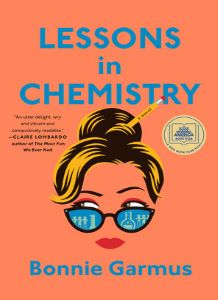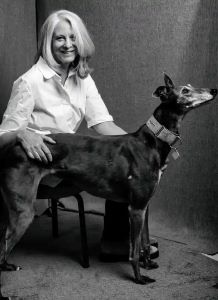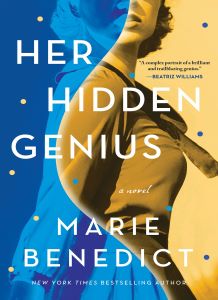 Lessons in Chemistry
Lessons in Chemistry
by Bonnie Garmus
GENRE: Historical Fiction, Literary Fiction
Chemist Elizabeth Zott is not your average woman. In fact, Elizabeth Zott would be the first to point out that there is no such thing as an average woman. But it’s the early 1960s and her all-male team at Hastings Research Institute takes a very unscientific view of equality. Except for one: Calvin Evans; the lonely, brilliant, Nobel–prize nominated grudge-holder who falls in love with—of all things—her mind. True chemistry results.
But like science, life is unpredictable. Which is why a few years later Elizabeth Zott finds herself not only a single mother, but the reluctant star of America’s most beloved cooking show Supper at Six. Elizabeth’s unusual approach to cooking (“combine one tablespoon acetic acid with a pinch of sodium chloride”) proves revolutionary. But as her following grows, not everyone is happy. Because as it turns out, Elizabeth Zott isn’t just teaching women to cook. She’s daring them to change the status quo.
Laugh-out-loud funny, shrewdly observant, and studded with a dazzling cast of supporting characters, Lessons in Chemistry is as original and vibrant as its protagonist.
 Author Biography
Author BiographyBonnie Garmus is a copywriter and creative director who has worked widely in the fields of technology, medicine, and education. She’s an open-water swimmer, a rower, and mother to two pretty amazing daughters. Born in California and most recently from Seattle, she currently lives in London with her husband and her dog, 99. - Author's website
Booklist
Garmus debuts with a perplexing feminist fairy tale set in 1960s Southern California. Plucky chemist Elizabeth Zott believes she's not like other women ("Most of the women she'd met in college claimed they were only there to get their MRS," Garmus writes. "It was disconcerting, as if they'd all drunk something that had rendered them temporarily insane"). She proceeds to fall madly in love with her colleague, have his child, and then, after being sidelined by double standards, sexual harassment, and scandal around her pregnancy, she's dismissed from her job and becomes an overnight sensation as the host of a daytime cooking show. This trajectory, and its few tragedies, are intermittently interrupted by the anthropomorphized thoughts of her dog, Six-Thirty: "Humans were strange, Six-Thirty thought, the way they constantly battled dirt in their aboveground world, but after death willingly entombed themselves in it." In the end, everything works out--not because the patriarchy is destroyed or fairness is achieved, but thanks to the favors of a rich female benefactor equipped to strike back at those who humiliated Zott. While the scenes of Zott hosting her show do have their charm, the overall effect is about as deep as a Hallmark card. The author has a great voice, but contemporary readers will be left wondering who this is for. Agent: Jennifer Joel, ICM. (April.)
Library Journal
It's the 1960s, and chemist Elizabeth Zott is getting pushback from her male-only colleagues at the Hastings Research Institute--except from misanthropic Nobel Prize contender Calvin Evans, who's enchanted by her mind. Meanwhile, Elizabeth has a surprise second calling; she becomes star of a hit TV cooking show called Supper at Six, mixing in chemistry ("combine one tablespoon acetic acid with a pinch of sodium chloride") as she subtly signals that women needn't accept things as they are. Sold in heated auctions to an eye-popping 34 countries so far, this debut promises to be really big.
Kirkus Reviews
Two chemists with major chemistry, a dog with a big vocabulary, and a popular cooking show are among the elements of this unusual compound. At the dawn of the 1960s, Elizabeth Zott finds herself in an unexpected position. She's the star of a television program called Supper at Six that has taken American housewives by storm, but it's certainly not what the crass station head envisions: " 'Meaningful?' Phil snapped. 'What are you? Amish? As for nutritious: no. You're killing the show before it even gets started. Look, Walter, it's easy. Tight dresses, suggestive movements...then there's the cocktail she mixes at the end of every show.' " Elizabeth is a chemist, recently forced to leave the lab where she was doing important research due to an out-of-wedlock pregnancy. Now she's reduced to explaining things like when to put the steak in the pan. "Be sure and wait until the butter foams. Foam indicates that the butter's water content has boiled away. This is critical. Because now the steak can cook in lipids rather than absorb H2O." If ever a woman was capable of running her own life, it's Elizabeth. But because it's the 1950s, then the '60s, men have their sweaty paws all over both her successes and failures. On the plus side, there's Calvin Evans, world-famous chemist, love of her life, and father of her child; also Walter Pine, her friend who works in television; and a journalist who at least tries to do the right thing. At the other pole is a writhing pile of sexists, liars, rapists, dopes, and arrogant assholes. This is the kind of book that has a long-buried secret at a corrupt orphanage with a mysterious benefactor as well as an extremely intelligent dog named Six-Thirty, recently retired from the military. ("Not only could he never seem to sniff out the bomb in time, but he also had to endure the praise heaped upon the smug German shepherds who always did.") Garmus' energetic debut also features an invigorating subplot about rowing. A more adorable plea for rationalism and gender equality would be hard to find. Copyright (c) Kirkus Reviews, used with permission.
 Her Hidden Genius
Her Hidden Genius
by Marie Benedict
Rosalind Franklin has always been an outsider. Whether working at the laboratory she adored in Paris or toiling at a university in London, she feels closest to the science. When she is assigned to work on DNA, she believes she can unearth its secrets. Rosalind knows if she just takes one more X-ray picture she can unlock the building blocks of life. Never again will she have to listen to her colleagues complain about her, especially Maurice Wilkins who'd rather conspire about genetics with James Watson and Francis Crick than work alongside her.
 The Last Animal
The Last Animal
by Ramona Ausubel
Teenage sisters Eve and Vera never imagined their summer vacation would be spent in the Arctic, tagging along on their mother’s scientific expedition. But there’s a lot about their lives lately that hasn’t been going as planned, and truth be told, their single mother might not be so happy either.
Now in Siberia with a bunch of serious biologists, Eve and Vera are just bored enough to cause trouble. Fooling around in the permafrost, they accidentally discover a perfectly preserved, four-thousand-year-old baby mammoth, and things finally start to get interesting. The discovery sets off a surprising chain of events, leading mother and daughters to go rogue, pinging from the slopes of Siberia to the shores of Iceland to an exotic animal farm in Italy, and resulting in the birth of a creature that could change the world—or at least this family.
 Where'd You Go, Bernadette
Where'd You Go, Bernadette
by Maria Semple
Bernadette Fox is notorious. To her Microsoft-guru husband, she's a fearlessly opinionated partner; to fellow private-school mothers in Seattle, she's a disgrace; to design mavens, she's a revolutionary architect; and to 15-year-old Bee, she is her best friend and, simply, Mom. Then Bernadette vanishes. It all began when Bee aced her report card and claimed her promised reward: a family trip to Antarctica. But Bernadette's intensifying allergy to Seattle -- and people in general -- has made her so agoraphobic that a virtual assistant in India now runs her most basic errands. A trip to the end of the earth is problematic. To find her mother, Bee compiles email messages, official documents, and secret correspondence.